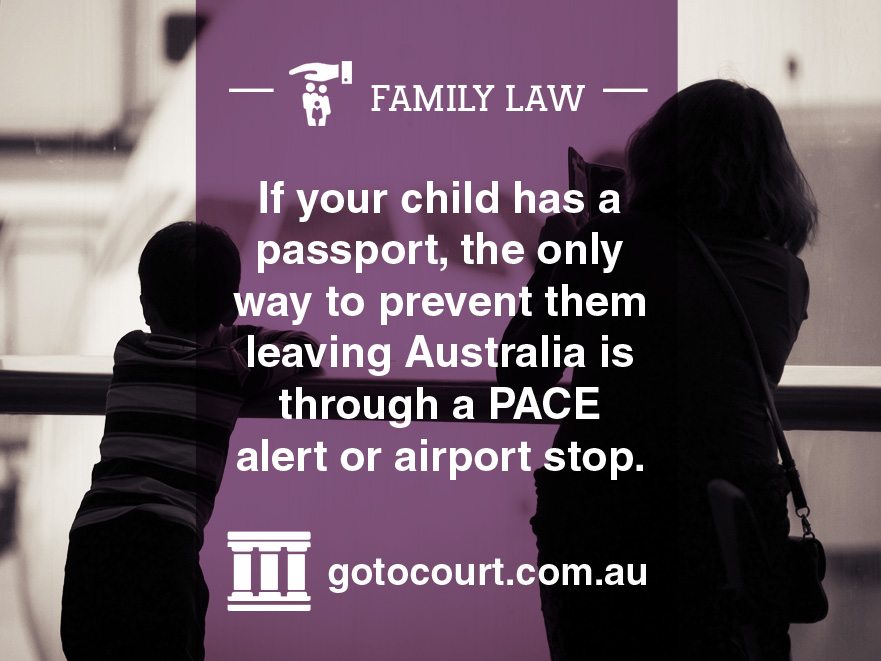
The Passenger Analysis Clearance and Evacuation System (PACE) can be used to place an alert which prevents a child from leaving Australia. This is more commonly referred to as an ‘airport stop.’ The process can also be used to prevent a child from leaving by sea, such as on a cruise ship.
If a child already has a passport, the only way to prevent them from leaving the country is to obtain a court order for a PACE alert and send it to the Australian Federal Police. If the child does not have a passport, you may instead be able to seek an injunction preventing their other parent from obtaining a passport for them.
The Family Law Act 1975 (Cth) permits the Family Court of Australia to make a parenting order preventing a child from travelling overseas, or limiting the countries to which they may travel to only those countries with which Australia has an international child abduction agreement in place.
You can make a request to the Court that it consider a matter urgently, if necessary. To do so, lodge your application with a supporting affidavit indicating why you need the matter dealt with quickly. You may be able to have it dealt with even without notice to the other parent. You should include a cover letter stating that the matter is urgent.
Once a Watch List Order has been made it usually remains for a period of two or three years; however, there are exceptions. For instance, when an order has been made that does not include a specified time period, the child will remain on the list until the age of 18 years.
If any amendments are made to parenting orders which allow the child to travel it is important that the Australian Federal Police are notified of this immediately.
A Watch List Order is made specifically against the child. It is not an order preventing travel with a certain person or parent.
Before a parent considers applying for a Watch List Order they must really think about the consequences of such an order. It may not always be appropriate to make an order against the child which will stop them from leaving the country. For instance, if the child wanted to attend an overseas school excursion they would be prevented from doing so if they are placed on the Watch List.
If you are uncertain as to whether or not a PACE alert has been issued for your child and their details added to the Watch List, you or your lawyer can lodge a Family Law Watch List Enquiry Form with the Australian Federal Police.
You will have to provide certified copies of your identification, as well as copies of any documents you have regarding applications that have been made to have the child placed on the list, or court orders issued.
In order to have the PACE alert withdrawn and your child’s name removed from the list, you should first talk to your lawyer.
The process required will depend upon how the child’s name was placed on the list in the first place. If it is the result of an injunction or a court order, you may require another court order to have them removed. If the existing order is only to apply for a particular period of time, then your child’s name will be removed at the end of that period.
This article reflects the state of the law as at 10 June 2016. It is intended to be of a general nature only and does not constitute legal advice. If you require legal assistance, please telephone 1300 636 846 or request a consultation at gotocourt.com.au.

No hay comentarios:
Publicar un comentario